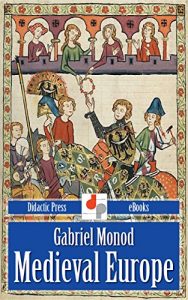Let us cast a glance backward over the nine centuries which have elapsed since the beginning of the great invasions. Four main facts stand out: (1) The slow, but inevitable, destruction of the Roman Empire; (2) the establishment of the feudal system; (3) the efforts made by Empire and Papacy to revive, for the individual benefit of each, classic unity; (4) the erection of separate governments, and the formation of a Christian Europe which is developed under the moral hegemony of the Church.1. At the close of the fourth century the Roman Empire was still standing. It had embodied the legal conception that all inhabitants of the world subject to Rome form a body politic in which the political status and rights of the individual are fixed by law, in which security to individuals and property is guaranteed by a hierarchy of officials who are directed by a magistrate with a life appointment and absolute power. This was the conception of the state, the imperishable creation of ancient Rome. The Mediterranean was the centre of the Roman world. Then came the barbarians, urged on by a kind of irresistible attraction towards so rich an empire, which offered so many delights to them, so poor. Gradually they flowed in, by slow infiltration or sudden inundation, selling or imposing their services upon her. When there ceased to be an emperor in the West and the sole head of the Empire lived at the other end of the world, at Constantinople, the barbarian kings settled throughout the Empire were in fact independent. The administrative machinery of the Romans was, on the whole, maintained, but they distorted its organic form through a misapprehension of its nature. They considered the soil which they occupied as their personal property, and the functionaries as tools for their rapaciousness. The idea of statehood disappeared. At the same time the equilibrium of the Mediterranean world was destroyed by the overwhelming advance of Islamism, which was taking possession of northern Africa entire and threatening the classic Græco- Latin civilisation on the Bosphorus and in the Pyrenees. Charlemagne attempted to restore some order in the political chaos of the West and stop the Arabian invasion; he was successful in so far that he left an imperishable memory in history, but the causes of disintegration were too deeply rooted to be swept away by a hand even as powerful as his.2. Feudalism then took shape. Individuals were no longer safe unless they placed themselves in the dependence of seignior, nor were lords, unless they assumed the obligations of vassalage. Royalty was powerless; political unity had disappeared; nothing remained but individual powers, often brutal and unbridled. It was the triumph of anarchy.
Medieval Europe AD 395-1270 (Illustrated) (English Edition)
Sobre
Talvez você seja redirecionado para outro site












